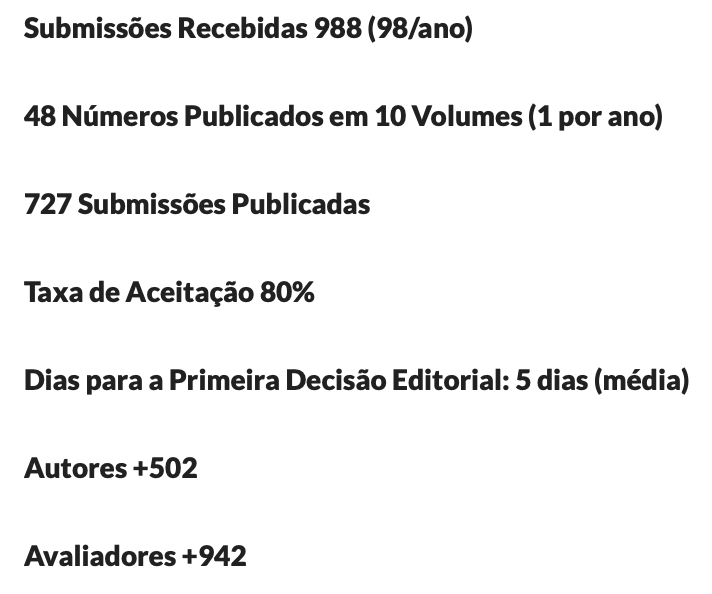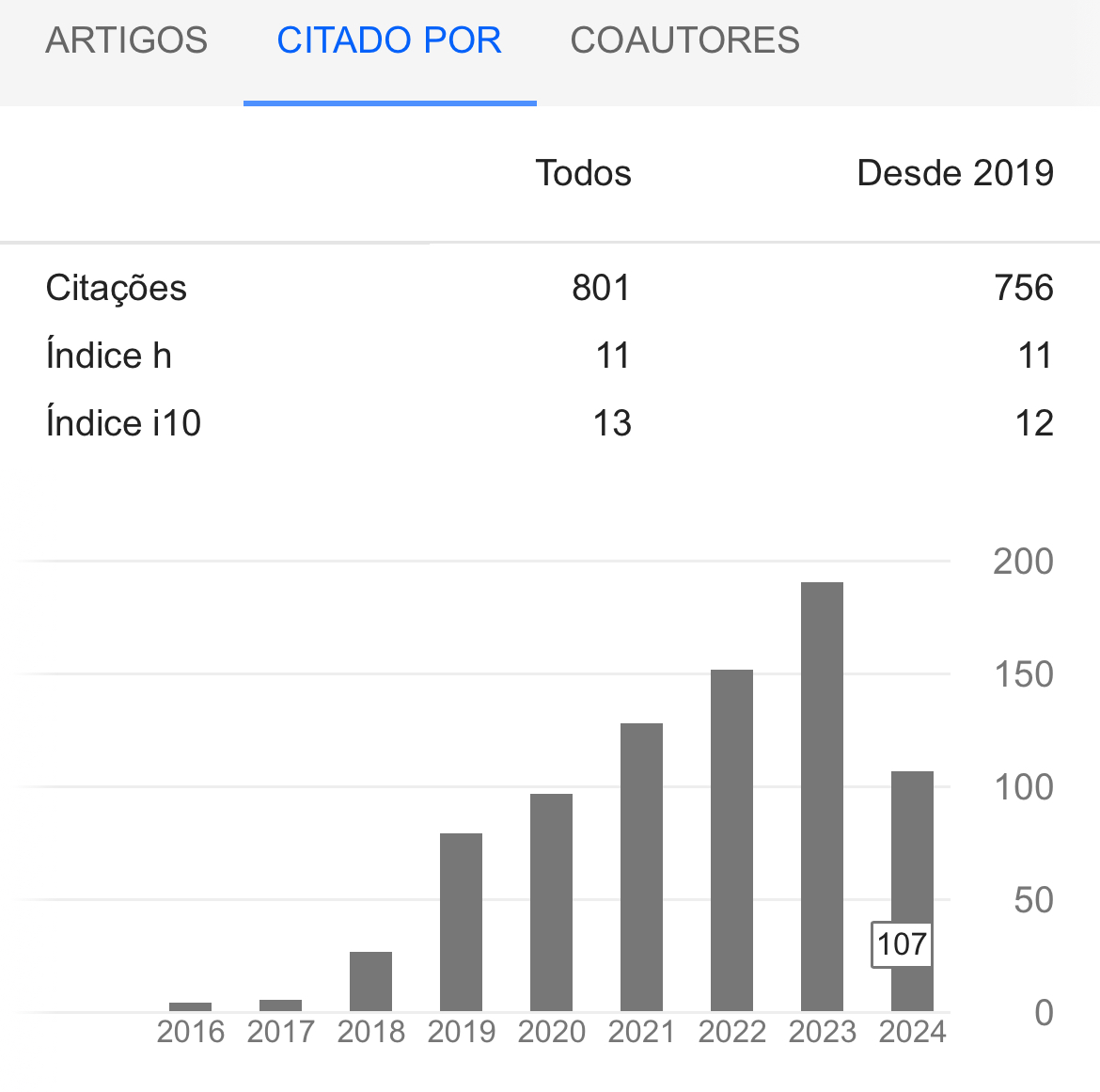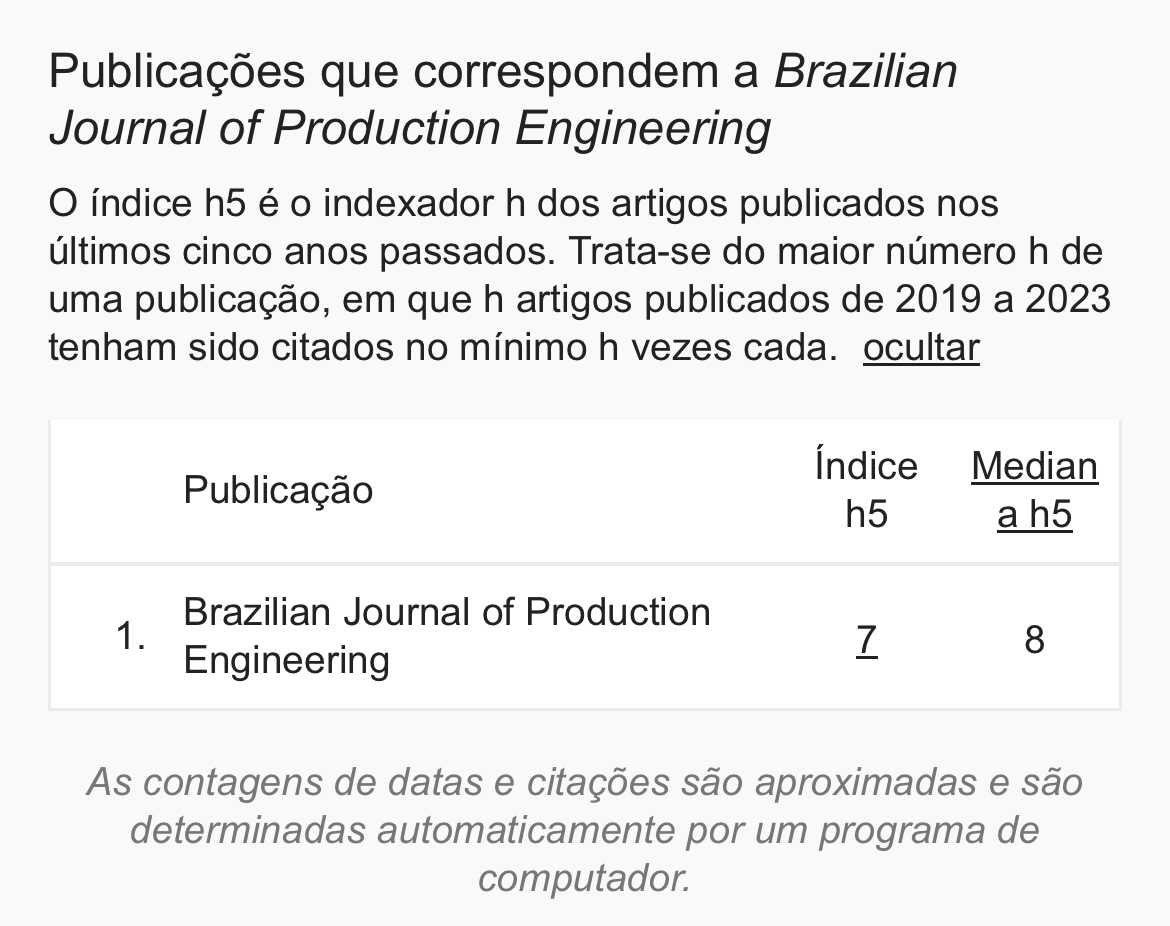Intenção empreendedora entre estudantes de sistemas de informação: investigando o papel do contexto familiar, autoemprego e gênero na educação de graduação
DOI:
https://doi.org/10.47456/bjpe.v7i3.35323Palavras-chave:
Intenção empreendedora, Estudantes de sistemas de informação, contexto familiar, gênero, auto empregoResumo
Esta pesquisa tem como objetivo investigar o papel do contexto familiar, auto emprego e gênero na educação de graduação em estudantes de sistemas de informação. Com relação à abordagem do problema, essa pesquisa caracteriza-se como quantitativa e quantos aos objetivos têm-se uma pesquisa exploratória. O procedimento técnico adotado foi o estudo de caso em estudantes do curso de sistemas de informação (número de respondentes igual a 100). Os principais resultados indicam que a maioria dos estudantes possui a intenção de se tornarem empreendedores no futuro: Estudantes que possuem família empreendedora tendem a apoiar mais o empreendedorismo; e comportamento empreendedor elevado no sexo feminino em relação ao sexo masculino. A importância desse estudo está em indicar como tais fatores (contexto familiar, auto emprego e gênero) afetam estudantes de graduação contribuindo para os aspectos teóricos e gerenciais dos estudos em intenção empreendedora no contexto da região amazônica.
Downloads
Referências
Acs, Z. J., Szerb, L., Lafuente, E., & Markus, G. (2020). Global Entrepreneurship Index 2019. The Global Entrepreneurship and Development Institute, 14, 64p. The Global Entrepreneurship and Development Institute. Retrieved from http://thegedi.org/global-entrepreneurship-and-development-index/
Acs, Z. J., Szerb, L., & Lloyd, A. (2018). Global entrepreneurship index 2018. Washington, D.C: The Global Entrepreneurship and Development Institute - GEDI.
Acs, Z. J. et al. (2017). GEDI - Global Entrepreneurship Index 2017. USA: GEDI.
Ahl, H. (2006). Why research on women entrepreneurs needs new directions. Entrepreneurship: Theory and Practice, 30(5), 595–621. https://doi.org/10.1111/j.1540-6520.2006.00138.x
Ajzen, I. (1991). The theory of planned behavior. Organizational Behavior and Human Decision Processes, 50(2), 179–211. https://doi.org/10.1016/0749-5978(91)90020-T
Angel, P., Jenkins, A., & Stephens, A. (2018). Understanding entrepreneurial sucess: a phenomenographic approach. International Small Business Journal, 36(6), 611-636.
Alves, L. R. R., & Bornia, A. C. (2011). Desenvolvimento de uma escala para medir o potencial empreendedor utilizando a Teoria da Resposta ao Item (TRI). Gestao e Producao, 18(4), 775–790. https://doi.org/10.1590/S0104-530X2011000400007
Bagheri, A., & Lope Pihie, Z. A. (2014). The moderating role of gender in shaping entrepreneurial intentions: Implications for vocational guidance. International Journal for Educational and Vocational Guidance, 14(3), 255–273. https://doi.org/10.1007/s10775-014-9269-z
Bako, Y. A., Ajibode, I. A., Oluseye, A. B., & Aladelusi, K. B. (2018). An Investigation of Entrepreneurial Intention Among Entrepreneurship Students in South-West Nigeria Polytechnics. International Journal of Entrepreneurial Knowledge, 5(2), 16–32. https://doi.org/10.1515/ijek-2017-0008
Baumol, W. J., Schilling, M. A., & Wolff, E. N. (2009). The superstar inventors and entrepreneurs: How were they educated? Journal of Economics and Management Strategy, 18, 711–728. https://doi.org/10.1111/j.1530-9134.2009.00227.x
Baumol, W. J. (2010). The microtheory of innovative entrepreneurship. The Microtheory of Innovative Entrepreneurship (pp. 1–246). Princeton University Press. https://doi.org/10.1093/ajae/aar056
Bird, B. (1988). Implementing Entrepreneurial Ideas: The Case for Intention. Academy of Management Review, 13(3), 442–453. https://doi.org/10.5465/amr.1988.4306970
Bloemen-Bekx, M., Voordeckers, W., Remery, C., & Schippers, J. (2019). Following in paretal footsteps? The influence of gender and learning expeeriences on entrepreneurial intentions. International Small Business Journal, 37(6), 642-663.
Bogatyreva, K., Edelman, L. F., Manolova, T. S., Osiyevskyy, O., & Shirokova, G. (2019). When do entrepreneurial intentions lead to actions? The role of national culture. Journal of Business Research, 96, 309–321. https://doi.org/10.1016/j.jbusres.2018.11.034
Bosma, N., et al. (2020). Global Entrepreneurship Monitor: 2019/2020 global report. London, UK: Global Entrepreneurship Research Association.
Bosma, N., Kelley, D. (2019). Global Entrepreneurship Monitor: 2018/2019 global report. London, UK: Global Entrepreneurship Research Association.
Braches, B., & Elliott, C. (2016). Articulating the entrepreneurship carrer: a study of german women entrepreneurs. International Small Business Journal, 35(5), 535-557.
Carayannis, E. G., Evans, D., & Hanson, M. (2003). A cross-cultural learning strategy for entrepreneurship education: Outline of key concepts and lessons learned from a comparative study of entrepreneurship students in France and the US. Technovation, 23(9), 757–771. https://doi.org/10.1016/S0166-4972(02)00030-5
Cassar, G. (2007). Money, money, money? a longitudinal investigation of entrepreneurship career reasons, growth preferences and achieved growth. Entrepreneurship and regional development, 19(1), 822-840.
Esfandiar, K., Sharifi-Tehrani, M., Pratt, S., & Altinay, L. (2019). Understanding entrepreneurial intentions: a developed integrated sctructural model approach. Journal of Business Research, 94, 172-182.
Gupta, V. K., Turban, D. B., Wasti, S. A., & Sikdar, A. (2009). The role of gender stereotypes in perceptions of entrepreneurs and intentions to become an entrepreneur. Entrepreneurship: Theory and Practice, 33(2), 397–417. https://doi.org/10.1111/j.1540-6520.2009.00296.x
Hamilton, E. (2013). The discourse of entrepreneurial masculinities (and femininities). Entrepreneurship and Regional Development, 25(1–2), 90–99. https://doi.org/10.1080/08985626.2012.746879
Hamilton, E. (2006). Whose story is it anyway? Narrative accounts of the role of women in founding and establishing family businesses. International Small Business Journal, 24(3), 253–271. https://doi.org/10.1177/0266242606063432
Harrison, R., Leitch, C., & Mcadam, M. (2015). Breaking Glass: Toward a Gendered Analysis of Entrepreneurial Leadership. Journal of Small Business Management, 53(3), 693–713. https://doi.org/10.1111/jsbm.12180
Hermans, J., Vanderstraeten, J., Van Witteloostuijn, A., Dejardin, M., Ramdani, D., & Stam, E. (2015). Ambitious entrepreneurship: A review of growth aspirations, intentions, and expectations. Advances in Entrepreneurship, Firm Emergence and Growth, 17, 127–160. https://doi.org/10.1108/S1074-754020150000017011
Júnior, E., & Gimenez, F. (2004). Potencial empreendedor: um instrumento para mensuração. Revista de Negócios, 9, 107–116. Retrieved from http://proxy.furb.br/ojs/index.php/rn/article/viewArticle/291
Herdjiono, I., Puspa, Y. H., Maulany, G., & Aldy, B. E. (2018). The Factors Affecting Entrepreneurship Intention. International Journal of Entrepreneurial Knowledge, 5(2), 5–15. https://doi.org/10.1515/ijek-2017-0007
Johara, F., Yahya, S. B., & Tehseen, S. (2017). Determinants of future entrepreneurship and entrepreneurial intention. Global Business and Management Research: an International Journal, 9(4), 80-95.
Kaltenecker, N., Hoerndlein, C., & Hess, T. (2015). The drivers of entrepreneurial intentions - an empirical study among information systems and computer science students. Journal of Entrepreneurship Education, 18(2), 39–52.
Katz, J. A. (1995). Modelling Entrepreneurial Career Progressions: Concepts and Considerations. Entrepreneurship Theory and Practice, 19(2), 23–39. https://doi.org/10.1177/104225879501900203
Kološta, S., Flaška, F., Nedelová, G., Kašcáková, A., Årethun, T., & Gunnar Nesse, J. (2018). Factors Influencing Entrepreneurial Intentions of Slovak Youth Growing up in Cities and in Villages. International Journal of Organizational Leadership, 7(3), 270–283. https://doi.org/10.33844/ijol.2018.60229
Krueger, N. F. (2017). Entrepreneurial Intentions Are Dead: Long Live Entrepreneurial Intentions (pp. 13–34). https://doi.org/10.1007/978-3-319-45544-0_2
Krueger N. F., Reilly, M. D., & Carsrud, A. L. (2000). Competing models of entrepreneural intentions. Journal of business venturing, 15, 411-432.
Kuckertz, A., & Wagner, M. (2010). The influence of sustainability orientation on entrepreneurial intentions - Investigating the role of business experience. Journal of Business Venturing, 25(5), 524–539. https://doi.org/10.1016/j.jbusvent.2009.09.001
Lapponi, J. C. (2005). Estatística usando Excel. Rio de Janeiro: Elsevier.
Laspita, S., Breugst, N., Heblich, S., & Patzelt, H. (2012). Intergenerational transmission of entrepreneurial intentions. Journal of Business Venturing, 27(4), 414–435. https://doi.org/10.1016/j.jbusvent.2011.11.006
Liang, C. T., & Liang, C. (2015). Interaction of psychological factors in shaping entrepreneurial intention among computer and eletrical engineering students. Journal of entrepreneurship, management and innovation, 11(2), 5-30.
Lopes Junior, G. S., & Sousa E. C. L. (2005). Atitude empreendedora em proprietários-gerentes de pequenas empresas: construção de um instrumento de medida. REAd, 11(6).
Marconi, M. A., & Lakatos, E. M. (2002). Técnicas de pesquisa: planejamento e execução de pesquisas, amostragens e técnicas de pesquisa, elaboração, analise e interpretação de dados. 5. Ed. São Paulo: Atlas.
Marlow, S., & McAdam, M. (2013). Gender and entrepreneurship: advancing debate and challenging myths: exploring the mistery of the under-performing female entrepreneur. International Journal of Entrepreneurial Behavior and Research, 19(1), 114-124.
Omidi Najafabadi, M., Zamani, M., & Mirdamadi, M. (2016). Designing a model for entrepreneurial intentions of agricultural students. Journal of Education for Business, 91(6), 338–346. https://doi.org/10.1080/08832323.2016.1218318
Nguyen, C. (2018). Demographic factors, family background and prior self-employment on entrepreneurial intention - Vietnamese business students are different: why? Journal of Global Entrepreneurship Research, 8(1). https://doi.org/10.1186/s40497-018-0097-3
Obschonka, M., Silbereisen, R. K., & Schmitt-Rodermund, E. (2016). Entrepreneurial intention as development outcome. IEEE Engineering Management Review, 44(1), 92–92. https://doi.org/10.1109/emr.2016.7448789
Osakede, U. A., Lawanson, A. O., & Sobowale, D. A. (2017). Entrepreneurial interest and academic performance in Nigeria: evidence from undergraduate students in the University of Ibadan, Journal of Innovation and Entrepreneurship, 6, 1-15.
Palmer, C., Fasbender, U., Kraus, S., Birkner, S., & Kailer, N. (2021). A chip off the old block? The role of dominance and parental entrepreneurship for entrepreneurial intention. Review of Managerial Science, 15(2), 287–307. https://doi.org/10.1007/s11846-019-00342-7
Randolph, R. V., Li, Z., & Daspit, J. J. (2019). Toward a Typology of Family Firm Corporate Entrepreneurship. Journal of Small Business Management, 57(3), 1102–1118. https://doi.org/10.1111/jsbm.12421
Rodrigues, A. P., Jorge, F. E., Pires, C. A., & António, P. (2019). The contribution of emotional intelligence and spirituality in understandind creativity and entrepreneurial intention of higher education students. Education + Training, 61(7/8), 870-894.
Santos, P. C. F. (2008). Uma escala para identificar potencial empreendedor. 2008. 364 f. Tese (Doutorado em Engenharia de Produção)-Universidade Federal de Santa Catarina, Florianópolis, 2008.
Schumpeter, J. A. (1997). Teoria do desenvolvimento econômico. São Paulo: Nova Cultural.
Schumpeter, J. A. (1961). Capitalismo, socialismo e democracia. Rio de Janeiro: Fundo de cultura.
Sesen, H. (2013). Personality or environment? A comprehensive study on the entrepreneurial intentions of university students. Education + Training, 55(7), 624–640. https://doi.org/10.1108/ET-05-2012-0059
Shapero, A. (1982). Social Dimensions of Entrepreneurship. In C. Kent, D. Sexton and K. Vesper, eds., The Encyclopedia of Entrepreneurship. Englewood Cliffs: Prentice-Hall, 72–90.
Shinnar, R. S., Hsu, D. K., Powell, B. C., & Zhou, H. (2018). Entrepreneurial intentions and start-ups: Are women or men more likely to enact their intentions? International Small Business Journal: Researching Entrepreneurship, 36(1), 60–80. https://doi.org/10.1177/0266242617704277
Shirokova, G., Osiyevskyy, O., & Bogatyreva, K. (2016). Exploring the intention–behavior link in student entrepreneurship: Moderating effects of individual and environmental characteristics. European Management Journal, 34(4), 386–399. https://doi.org/10.1016/j.emj.2015.12.007
Shook, C. L., & Bratianu, C. (2010). Entrepreneurial intent in a transitional economy: na application of the theory of planned behavior to romanian students. IntEntrepManag J, 6, 231-247.
Silva, E. L., & Menezes, E. M. (2005). Metodologia da pesquisa e elaboração de dissertação. 4. ed. Florianópolis: UFSC.
Silvestre, A. L. (2007). Análise de dados e estatística descritiva. Lisboa/Portugal: Escola Editora.
Souitaris, V., Zerbinati, S., & Al-Laham, A. (2007). Do entrepreneurship programmes raise entrepreneurial intention of science and engineering students? The effect of learning, inspiration and resources. Journal of Business Venturing, 22(4), 566–591. https://doi.org/10.1016/j.jbusvent.2006.05.002
Veciana, J. M., Aponte, M., & Urbano, D. (2005). University Students’ Attitudes Towards Entrepreneurship: A Two Countries Comparison. The International Entrepreneurship and Management Journal, 1(2), 165–182. https://doi.org/10.1007/s11365-005-1127-5
Vieira, F. D., & Rodrigues, C. S. (2014). Os estudantes de engenharia e as suas intenções empreendedoras. Revista Produção Online, 14(1), 242. https://doi.org/10.14488/1676-1901.v14.i1.1588
Wang, C. K., & Wong, P. K. (2004). Entrepreneurial interest of university students in Singapore. Technovation, 24(2), 163–172. https://doi.org/10.1016/S0166-4972(02)00016-0
Weiss, J., Anisimova, T., & Shirokova, G. (2019). The translation of entrepreneurial intention into start-up behaviour: The moderating role of regional social capital. International Small Business Journal: Researching Entrepreneurship, 37(5), 473–501. https://doi.org/10.1177/0266242619831170
Wilson, F., Kickul, J., & Marlino, D. (2007). Gender, entrepreneurial self-efficavy, and entrepreneurial career intentions: implications for entrepreneurship education. Entrepreneurship Theory and Practice, 31(3), 387-406.
Yin, R. K. (1994). Case Study Research, Design and Methods, 2nd ed. Newbury Park, Sage Publications.
Downloads
Publicado
Como Citar
Edição
Seção
Licença
Copyright (c) 2021 Brazilian Journal of Production Engineering - BJPE

Este trabalho está licenciado sob uma licença Creative Commons Attribution-NonCommercial-ShareAlike 4.0 International License.

Atribuição 4.0 internacional CC BY 4.0 Deed
Esta licença permite que outros remixem, adaptem e desenvolvam seu trabalho não comercialmente, contanto que eles creditem a você e licenciem suas novas criações sob os mesmos termos.















































































